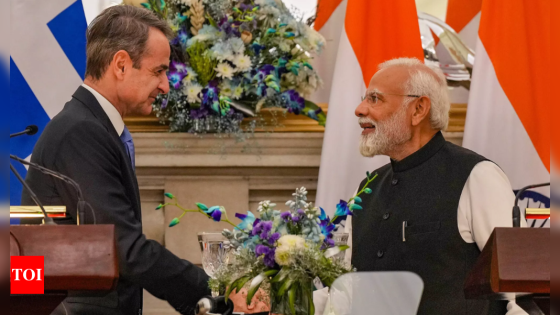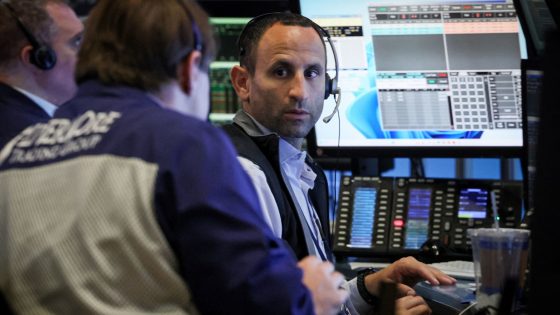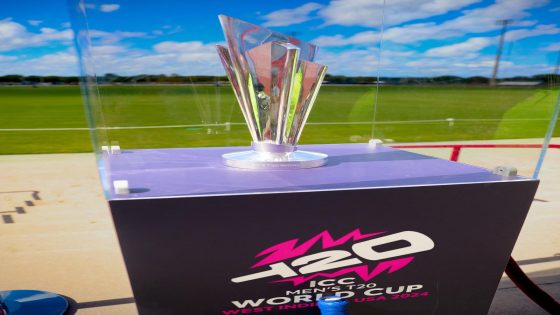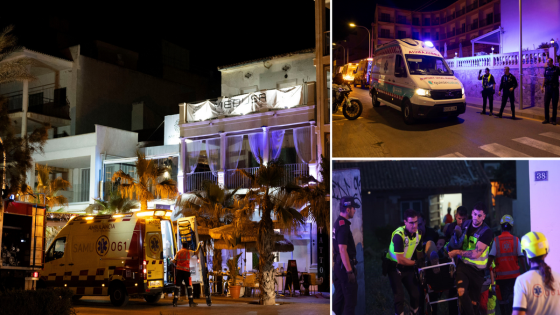NEW DELHI: ew Delhi: India and Greece looked to boost their nascent strategic partnership as Prime Minister Narendra Modi discussed defence co-production and co-development with his visiting counterpart Kyriakos Mitsotakis, saying both countries could benefit from opportunities in defence collaboration. Speaking later, Modi said India and Greece had agreed to link their defence industries.
Mitsotakis, the chief guest for Raisina Dialogue, is paying a return visit to India after Modi travelled to Athens in Aug last year for what was the first visit to Greece by an Indian PM in 40 years.The two leaders had then ungraded India-Greece ties to a strategic partnership.
In their meeting on Wednesday, the leaders also discussed counter-terrorism, IMEC cooperation, Indo-Pacific, the Gaza situation and other regional and global issues, emphasising that conflicts and tensions are best resolved through dialogue and diplomacy.
Foreign secretary Vinay Kwatra ruled out any change in the “alignment” of the transnational India-Middle East-Europe Economic Corridor (IMEC) because of the Gaza war, as he admitted there was a discussion on the issue. India and the UAE set IMEC in motion recently by signing an agreement to facilitate regional connectivity, but concerns remain about how the Israel-Hamas war will impact the landmark initiative.
Describing India as a pillar of stability in the Indo-Pacific, Mitsotakis urged India to forge a global partnership to deal with challenges resulting from the Ukraine and West Asia conflicts.
In his media remarks after the bilateral, Modi said the IMEC corridor will contribute significantly to the development of humanity in the long run and that Greece can also become an important partner in this initiative. Greece also wants to act as India’s gateway to Europe by offering Indian investors access to its seaports and airports.According to Modi, the growing India-Greece defence and security cooperation reflects deep mutual trust and, with the formation of a working group in this area, the two countries will be able to increase mutual coordination on common challenges like defence, cyber security, counterterrorism, and maritime security.
“New opportunities for co-production and co-development are being created in defence manufacturing in India, which can be beneficial for both the countries. We have agreed to link the defence industries of both the countries,” said Modi.
“India and Greece have common concerns and priorities in the fight against terrorism. We discussed in detail how to further strengthen our cooperation in this area,” he added.
The two PMs discussed regional and international issues, agreeing that all disputes and tensions should be resolved through dialogue and diplomacy. “We welcome Greece’s active participation and positive role in the Indo-Pacific. It is a matter of joy that Greece has decided to join the Indo-Pacific Oceans Initiative,” said Modi, adding there was also an agreement for cooperation in the Eastern Mediterranean region, a geopolitical hot potato because of the dispute between Greece and Turkey.
Govt’s backing of Greece is an acknowledgement of the latter’s support for India on the issue of cross-border terrorism and payback for Turkey which has supported Pakistan on the J&K issue. India’s efforts to enhance bilateral ties with Greece have been aided by the fact that both countries have solidly backed each other on issues of core national interest – J&K for India and Greece’s dispute with Turkey over Cyprus.
Modi said several new initiatives were identified to give a “modern form” to relations, including early conclusion of the Migration and Mobility Partnership Agreement between the two countries. This will further strengthen our people-to-people relations, he said.
Mitsotakis, the chief guest for Raisina Dialogue, is paying a return visit to India after Modi travelled to Athens in Aug last year for what was the first visit to Greece by an Indian PM in 40 years.The two leaders had then ungraded India-Greece ties to a strategic partnership.
In their meeting on Wednesday, the leaders also discussed counter-terrorism, IMEC cooperation, Indo-Pacific, the Gaza situation and other regional and global issues, emphasising that conflicts and tensions are best resolved through dialogue and diplomacy.
Foreign secretary Vinay Kwatra ruled out any change in the “alignment” of the transnational India-Middle East-Europe Economic Corridor (IMEC) because of the Gaza war, as he admitted there was a discussion on the issue. India and the UAE set IMEC in motion recently by signing an agreement to facilitate regional connectivity, but concerns remain about how the Israel-Hamas war will impact the landmark initiative.
Describing India as a pillar of stability in the Indo-Pacific, Mitsotakis urged India to forge a global partnership to deal with challenges resulting from the Ukraine and West Asia conflicts.
In his media remarks after the bilateral, Modi said the IMEC corridor will contribute significantly to the development of humanity in the long run and that Greece can also become an important partner in this initiative. Greece also wants to act as India’s gateway to Europe by offering Indian investors access to its seaports and airports.According to Modi, the growing India-Greece defence and security cooperation reflects deep mutual trust and, with the formation of a working group in this area, the two countries will be able to increase mutual coordination on common challenges like defence, cyber security, counterterrorism, and maritime security.
“New opportunities for co-production and co-development are being created in defence manufacturing in India, which can be beneficial for both the countries. We have agreed to link the defence industries of both the countries,” said Modi.
“India and Greece have common concerns and priorities in the fight against terrorism. We discussed in detail how to further strengthen our cooperation in this area,” he added.
The two PMs discussed regional and international issues, agreeing that all disputes and tensions should be resolved through dialogue and diplomacy. “We welcome Greece’s active participation and positive role in the Indo-Pacific. It is a matter of joy that Greece has decided to join the Indo-Pacific Oceans Initiative,” said Modi, adding there was also an agreement for cooperation in the Eastern Mediterranean region, a geopolitical hot potato because of the dispute between Greece and Turkey.
Govt’s backing of Greece is an acknowledgement of the latter’s support for India on the issue of cross-border terrorism and payback for Turkey which has supported Pakistan on the J&K issue. India’s efforts to enhance bilateral ties with Greece have been aided by the fact that both countries have solidly backed each other on issues of core national interest – J&K for India and Greece’s dispute with Turkey over Cyprus.
Modi said several new initiatives were identified to give a “modern form” to relations, including early conclusion of the Migration and Mobility Partnership Agreement between the two countries. This will further strengthen our people-to-people relations, he said.
Source Agencies




